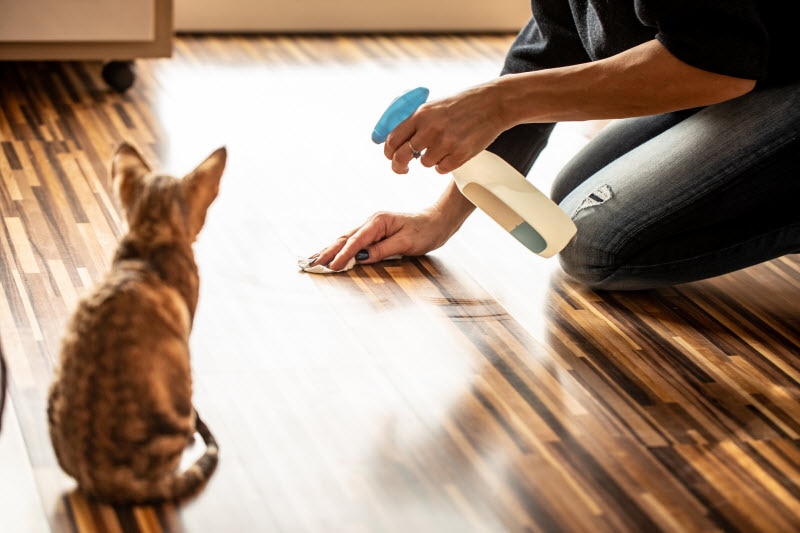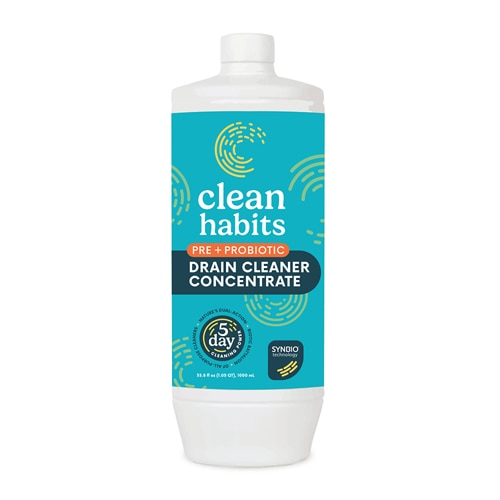[vc_row][vc_column][vc_column_text]For years, we were obsessed with disinfecting our homes. Products claiming to "kill 99.9% of germs on contact!" populated our cabinets, and we leaped to the rescue with a spray bottle whenever someone touched a doorknob after sneezing.
But our enthusiasm for germ-free surfaces may have done us more harm than good. Many disinfectants contain ingredients that can
cause respiratory problems, trigger asthma symptoms or irritate skin and eyes.

In response to these concerns, probiotic cleaners are emerging as an alternative. Formulated with beneficial bacteria that produce dirt-dissolving enzymes, these products promise to clean your home without potentially harmful chemicals.
What is a probiotic cleaner?
Probiotic cleaners replace chemical disinfectants with probiotic bacteria from genera like
Bacillus, Bifidobacterium, Lactobacillus, Rhodopseudomonas, or
Saccharomyces.
Bacillus species are the most common, so that's what you'll typically see in household products. These bacteria are produced through fermentation and combined with other ingredients, which may include surfactants or essential oils.
How does cleaning with probiotics work?
Most probiotic cleaning products exclude disinfectant chemicals in favor of biodetergents: biological cleaners that use enzyme activity to break down grime, slime and other household gunk. After the dirt is cleared away, probiotics are supposed to "crowd out" bad bacteria and prevent them from coming back.
Manufacturers say that biodetergents and the probiotics that create them are safer than disinfectants—and just as effective. The promise of a healthier clean and a better "home microbiome" sounds great, but do the claims stand the test of science?
Testing probiotic cleaning product claims
Although cleaning with probiotics is a relatively new trend, several studies have tested the efficacy of these products and showed fairly consistent results:
The outcomes seem promising, but one other study is worth noting. When scientists from South Africa and Canada
tested probiotic cleaners against plain soap as well as disinfectants, both probiotic cleaners and soap were better at preventing pathogens from growing back.
But plain soap outperformed probiotics when tested against bacteria that form biofilms—groups of microbes that literally stick together in communities protected by a matrix of cellular proteins. Scientists believe this may be because cleaning with soap supported a diverse surface microbiome that could more effectively prevent biofilm growth than a single-strain probiotic.
However, the study only focused on how well the cleaners deterred pathogens and biofilms from growing, not which was best for eliminating microbes already on surfaces.
Cleaning with Probiotics: Are Probiotic Cleaners Worth Trying?
Overall, science appears to support the idea that probiotic cleaning products are just as good as—or even better than—disinfectants at keeping your home clean. Studies show these cleaners have the potential to remove more harmful bacteria than traditional cleaners and prevent common pathogens from returning.
Do probiotic cleaners have risks?
Although cleaners made with probiotics are generally marketed as safe, the
FDA doesn't currently regulate microbes in cleaning products. That means it's not always possible to know whether the probiotics listed on the label are actually in the cleaner, how much of each strain is present, or whether other bacteria were accidentally introduced during fermentation.
Some microbes can be opportunistic pathogens—that is, they can cause illness in people who are vulnerable to infections, such as those with compromised immune systems. It's also unclear whether all strains are safe for other living things around your home, like pets and plants.
So far, though, there haven't been any reports of health issues linked to probiotic cleaning. Studies are needed to determine potential long-term effects in settings like hospitals where microbial exposure may be higher due to more frequent cleaning.
How to choose a probiotic cleaner for your home
If you're looking for an alternative to chemical disinfectants and want to give probiotic cleaning products a try:
- Read reviews to see what others recommend based on experience
- Check ingredient lists to find formulas free of chemical disinfectants
- Look for products formulated for specific types of cleaning, such as bathrooms or floors
- Choose a pet-friendly option if you have pets
When you find a product that works well for the most common messes around your home, stick with it to see how it performs. Controlling microbes with microbes could turn out to be the healthier answer to our long-standing fight against germs.[/vc_column_text][/vc_column][/vc_row][vc_row][vc_column][vc_text_separator title="Featured Products" border_width="2"][vc_row_inner equal_height="yes" content_placement="middle" gap="35"][vc_column_inner width="1/3"][vc_single_image image="175582" img_size="full" alignment="center" onclick="custom_link" img_link_target="_blank" css=".vc_custom_1717188688379{padding-right: 7% !important;padding-left: 7% !important;}" link="https://www.vitacost.com/clean-habits-probiotic-floor-cleaning-concentrate"][/vc_column_inner][vc_column_inner width="1/3"][vc_single_image image="175583" img_size="full" alignment="center" onclick="custom_link" img_link_target="_blank" css=".vc_custom_1717188708299{padding-right: 7% !important;padding-left: 7% !important;}" link="https://www.vitacost.com/clean-habits-probiotic-multi-purpose-cleaning-spray"][/vc_column_inner][vc_column_inner width="1/3"][vc_single_image image="175584" img_size="full" alignment="center" onclick="custom_link" img_link_target="_blank" css=".vc_custom_1717188728276{padding-right: 7% !important;padding-left: 7% !important;}" link="https://www.vitacost.com/clean-habits-probiotic-laundry-detergent-50-loads-washing-machine-cleaner"][/vc_column_inner][/vc_row_inner][/vc_column][/vc_row]
 In response to these concerns, probiotic cleaners are emerging as an alternative. Formulated with beneficial bacteria that produce dirt-dissolving enzymes, these products promise to clean your home without potentially harmful chemicals.
In response to these concerns, probiotic cleaners are emerging as an alternative. Formulated with beneficial bacteria that produce dirt-dissolving enzymes, these products promise to clean your home without potentially harmful chemicals.



